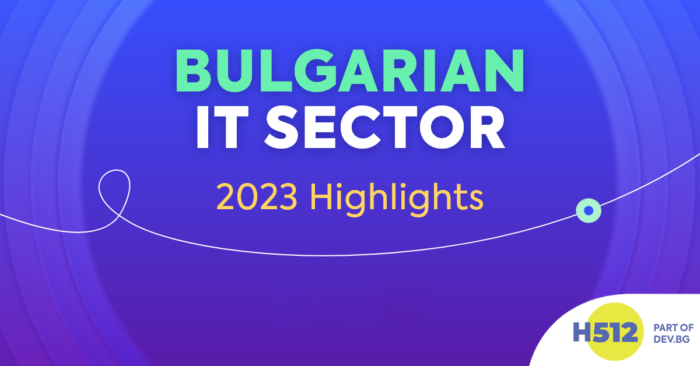This year has not been the easiest for our sector either. A telling fact is that we send it with fewer open positions in the job board of H512.com – less than 2 500 in early December compared to almost 3 500 in January, and the year-on-year growth has doubled according to the latest report of BASCOM. The slowdown in the tech industry worldwide has also had an impact on our market, but this by no means means that we have not experienced many moments in 2023 that have given us confidence and a strong dose of pride that the Bulgarian IT sector is not easily intimidated and continues boldly forward.
Earth to Space
By Earth, we mean Bulgaria, and before we reached space again, we first conquered the heavens. In May, we witnessed the first successful flight of a cargo drone in the world – “Black Swan” by the company Dronamics, founded by brothers Svilen and Konstantin Rangelov. It flew 21.5km at an average speed of 140km/h at an altitude of over 600m, validating the company’s license for commercial drone flights in Europe. Such have just started in our southern neighbour and users of Greece’s national postal service ELTA will receive their parcels with Dronamics’ drones, which are up to 80% faster, 50% cheaper and 60% lower in carbon emissions compared to traditional transport. In addition, the Black Swan is ergonomic and needs only 400 m to land and take off. It will thus reach settlements with poor infrastructure. We would mention in passing that since the beginning of the year, nearly 100 post offices have been closed in Bulgaria, many of them in remote mountainous areas.
In the meantime, Elon Musk’s first SpaceX mission for 2023 included a Bulgarian “explorer” on board – the Platform-2 microsatellite of EnduroSat. The Bulgarian space technology company was founded in 2015 by Raicho Raichev and has experienced explosive growth over the past few years due to its innovative nanocarriers, which are just 1-10 kg in size but powerful enough to conduct important scientific research or serve as a platform for training in the space sector. Platform-2’s mission is also exploratory because a plasma electric propulsion system will be tested on board the vehicle in orbit. However, its mission does not stop there. Platform-2 is one of the company’s first commercial satellites, giving customers complete freedom over the payloads they want to put into orbit, providing precise information through weather sensors, scientific sensors and various communication tools. If Platform-2’s star voyage proves successful, EnduroSat’s commercial satellites will bring the total to six, cementing the company’s position in providing satellite capacity to customers across a variety of sectors.
Worldwide rankings and investments
This year, prestigious international business rankings did not pass by Bulgarian technology stars. In the seventh edition of the FT1000 Fastest Growing Companies in Europe, Pontica Solutions ranked 715th. The outsourcing company was founded in 2015 and today has 800 employees in its offices in Sofia, Varna, Burgas and Krakow (Poland), serving clients from all continents in over 20 languages. Block-storage solutions developer StorPool, also founded in 2015, was included in the FT1000 for the second consecutive year, taking the 742nd spot. The rankings are compiled by the Financial Times and Statista and are a key indicator of business development and the capacity of participants, which is watched with interest by potential investors. And as one of the criteria for participation is a minimum organic revenue over a three-year period, the ranking is also indicative of how consistent the companies included are in their development.
Boty Dimanov, co-founder of Tenyks, entered the Forbes “30 under 30” ranking for Europe in the “Technology” category. The company currently only has an office in the UK and is an AI “doctor” – helping AI developers understand if it is working properly, find bugs and neutralise potentially dangerous or unwanted behaviour from AI. As Dimanov himself says, the platform protects the world from the Terminator. It will be recalled that Tenyks, founded in 2019, last year raised $3.4 million in funding and its first customers, with the ambition to reach $1 million in revenue by the end of 2023.
Speaking of investments, we’ll devote special attention to the topic in a separate piece because there’s a lot to share, but here we’ll mention one of the most inspiring news from the end of the year. In November, Bulgarian-American company LucidLink raised $75 million from private equity funds Brighton Park Capital, Headline, Baseline Ventures and Adobe Ventures. This is the largest investment with Bulgarian participation and LucidLink will use it to update its products and expand its leadership position in the global cloud data market. The company was founded in 2016 by Georgi Dochev and Peter Thompson, and its R&D department is based in Bulgaria, where 50 native talents are changing the way users access their data.
More native offices abroad
And while some Bulgarian IT organizations attracted significant investments during the year, others made ones near and far. The list is long, so we’ll just skim.
In April, Bee Smart Technologies, a remote hive tracking and bee product trading company, announced that it had officially set foot in Romania with its www.pollenity.com platform and had already built a network of beekeepers, distributors and logistics partners in the country to which to offer its True Honey business model and Adopt-A-Hive service. Our northern neighbour is the first step in the international expansion of Bee Smart Technologies, which in 2022 raised £1.2m on the Bee Exchange SME Growth Market (BEAM). A few months later, Bulgarian eCommerce-as-a-service company CloudCart also entered the market in Romania. It was founded in 2016 by brothers Nikolay and Petar Iliev and offers software for creating online stores as well as a comprehensive ecosystem of partnerships, tools and support services. CloudCart currently operates in seven regional markets, with plans to expand into Serbia, Croatia, and Bosnia and Herzegovina. More than 1,500 companies are using CloudCart’s platform and thanks to it have recorded total sales of €300 million in 2022.
In June, Bulgarian startup AMPECO, which develops a charging station management platform, said ‘Bonjour Paris!’, opening an office in the French capital. The choice is strategic, as France is the second country in Europe with the most public charging stations – over 100,000 by mid-2023, expected to reach 400,000 by 2030. AMPECO’s new office will be an active part of that growth, after the company raised over $16 million in funding last year. A few months later, software company Devision, which specialises in the energy, fintech and IoT sectors, opened an office in another leading European capital, London. The expansion is part of Devision’s strategy to establish itself as an international company, having first set foot in Amsterdam (the Netherlands), and a physical presence in London will allow it to be at arm’s length from the world’s latest innovations.
Northern Europe’s business landscape was also marked by a Bulgarian presence. After more than a decade of operating in the Nordic markets, one of the first home-grown IT companies, Sirma Group Holding, registered its subsidiary Sirma AB in Stockholm (Sweden) to offer its full range of products and services to both the countries of the region and the markets of Germany, Austria, Switzerland, Belgium, the Netherlands and Luxembourg. In addition, the company has indicated that it will open offices in Spain and Central Europe in 2024. Meanwhile, Musala Soft has opened an office in Cairo for nearly 80 employees. Established 23 years ago, the Bulgarian company, which was acquired by the Czech ARICOMA Group last year, began operating in Egypt during the pandemic in a remote mode of operation, but since June has offered its employees office space from which to work on international projects and the digital transformation of in-house systems.
Science is sunshine
And that sun began to shine ever brighter in 2023 thanks to a number of technology and science organisations headed by the Institute for Computer Science, an Institute of Intelligence and Technology (IINSALT). It was one of the organisations invited to participate in the world’s first global Artificial Intelligence Alliance, initiated by IBM and Meta, which aims to bring together the world’s greatest minds from the private sector, academia and institutions to build open, safe and responsible artificial intelligence. Because of its strong track record and potential for growth, Amazon Web Services has donated $1 million to INSALT, which the institute will use for research in formal methods, researcher salaries, and fellowships for PhD students and undergraduates. Such as Hristo Venev, a PhD student at INSAIT, who in mid-January won third place at the ACM POPL SRC, the most prestigious undergraduate research forum, with his work on creating the world’s first high-level compiler for quantum programming languages.
In May, the Center for Digital Technologies at the Technical University of Sofia was inaugurated. It includes 14 state-of-the-art computer laboratories, built with donations from leading IT companies and funding from the Science and Education for Smart Growth OP. It will host practical classes for future IT talents, as well as scientific and research projects. The area of the centre is about 2,700 sqm and it will train about 3,500 students per year in computer systems, software engineering, communications and communication engineering.
This year also saw the inauguration of the new Centre of Excellence in Informatics at BAS with a special permanent “guest”, the Bulgarian supercomputer Hemus. The complex includes a data storage system, local application development centers and digitization tools, a 3D digitization lab and a microstructural analysis lab. The complex has been funded with nearly 30 million BGN under the Science and Education for Smart Growth 2014-2020 Operational Programme through the European Regional Development Fund, and the Hemus supercomputer has nearly 100,000 cores and a throughput of over 3 PetaFlops, allowing the parallel execution of nearly 100,000 tasks and subtasks and the return of results within a day. It can be used to perform research in areas such as artificial intelligence, climatology, bioinformatics, chemistry, drug design, high-throughput big data analytics, and much more. All of this will greatly facilitate the work and new scientific breakthroughs of our best scientists.
New career opportunities
Last but not least, in 2023 the IT sector was boosted by the entry of new companies in Bulgaria. We will also pay special attention to this topic, because there are indeed many new employers, but one of them is the American LivePerson, which is developing an inĸtributed inĸt (Сонѵерѕаtіonal аrtіfісіаl іntеllіgеnсе). It has pledged to create 130 jobs by the end of the year and employ over 200 people in its Sofia office by the end of 2024. Another US company, RingCentral, has opened a support and development centre in Bulgaria. The global provider of cloud-based business communications solutions uses artificial intelligence to combine phone calls, messaging, contact centres and video meetings, and plans to open 300 new jobs within two years and grow to 450 people within five.
In the middle of the year, German automotive software provider Sulzеr announced it would invest €1.5m in an R&D centre in Sofia, creating nearly 100 new jobs for IT professionals in phases. A month later, international business transformation and digitalisation company Valtech opened its first office in the country, which is the company’s 23rd market. Stormwall, a Slovakian developer of cloud services for DDoS attack protection, also opened an office in Sofia to increase the capacity of StormWall’s global filtering network and offer companies in Bulgaria and neighboring countries reliable protection.
All of these highlights are, of course, a very small part of what is happening in the IT industry in 2023. The big picture we see in BASCOM’s annual report is that the sector contributes taxes and social security that are three times the national average, and that it is a major investor in improving the environment in which we live and work, and a key factor in retaining young people in Bulgaria. In short, “we are the most solid and socially responsible sector in Bulgaria”, which will continue to create inspiring stories and offer dignified and meaningful fulfilment despite the difficulties.


 Publish date: 18 December, 2023
Publish date: 18 December, 2023


 Sofia
Sofia Hybrid
Hybrid